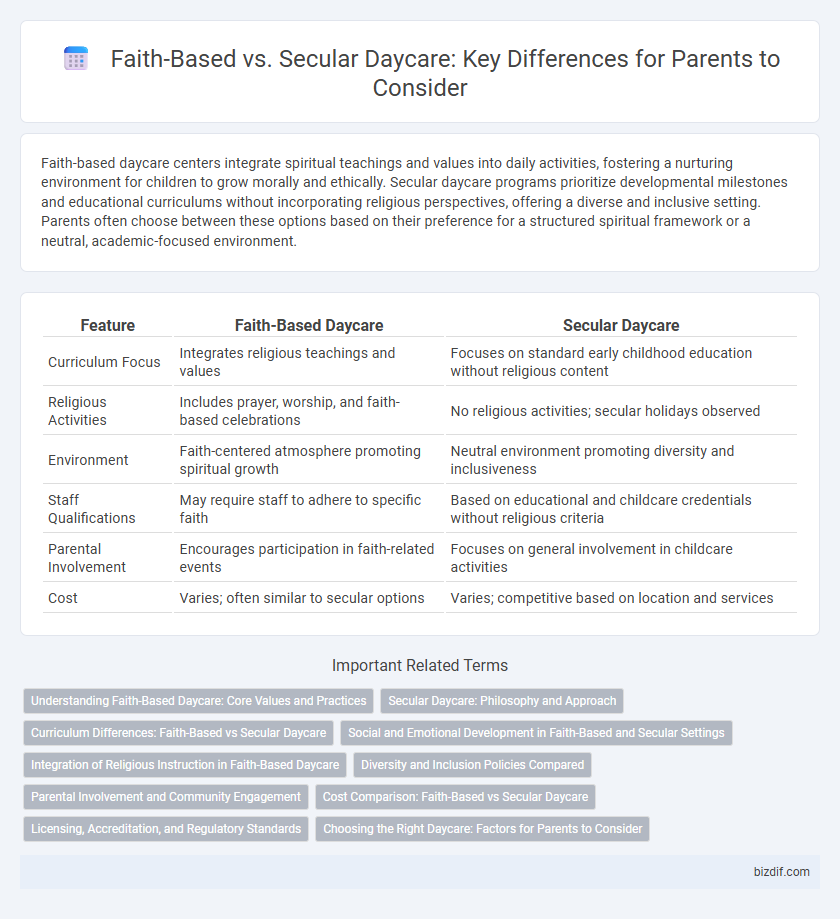Faith-based daycare centers integrate spiritual teachings and values into daily activities, fostering a nurturing environment for children to grow morally and ethically. Secular daycare programs prioritize developmental milestones and educational curriculums without incorporating religious perspectives, offering a diverse and inclusive setting. Parents often choose between these options based on their preference for a structured spiritual framework or a neutral, academic-focused environment.
Table of Comparison
| Feature | Faith-Based Daycare | Secular Daycare |
|---|---|---|
| Curriculum Focus | Integrates religious teachings and values | Focuses on standard early childhood education without religious content |
| Religious Activities | Includes prayer, worship, and faith-based celebrations | No religious activities; secular holidays observed |
| Environment | Faith-centered atmosphere promoting spiritual growth | Neutral environment promoting diversity and inclusiveness |
| Staff Qualifications | May require staff to adhere to specific faith | Based on educational and childcare credentials without religious criteria |
| Parental Involvement | Encourages participation in faith-related events | Focuses on general involvement in childcare activities |
| Cost | Varies; often similar to secular options | Varies; competitive based on location and services |
Understanding Faith-Based Daycare: Core Values and Practices
Faith-based daycare centers emphasize spiritual development by integrating religious teachings and values into daily activities, fostering a nurturing environment grounded in faith principles. These centers often incorporate prayer, scripture lessons, and moral guidance as core components, supporting children's emotional and ethical growth alongside educational development. Tailoring care to reflect specific religious traditions, faith-based daycares provide families with an environment that aligns with their personal beliefs while promoting community and character building.
Secular Daycare: Philosophy and Approach
Secular daycare centers emphasize inclusivity, focusing on child development through evidence-based practices and diverse cultural exposure. Their philosophy prioritizes fostering cognitive, social, and emotional growth without religious influence, creating an environment where children of all backgrounds feel welcome. Curriculum typically integrates play-based learning, STEM activities, and social skills development to prepare children for formal education.
Curriculum Differences: Faith-Based vs Secular Daycare
Faith-based daycare curricula integrate religious teachings, values, and practices alongside standard early childhood education, fostering spiritual development and moral guidance. Secular daycare programs emphasize age-appropriate learning through play, cognitive skill-building, and socialization without religious content, following state or national educational standards. Parents choosing between faith-based and secular daycare often consider curriculum alignment with family beliefs and the desired balance between spiritual and academic growth.
Social and Emotional Development in Faith-Based and Secular Settings
Faith-based daycare environments often integrate spiritual teachings with social interactions, fostering a sense of community and moral development that supports emotional resilience in children. Secular daycare settings typically emphasize inclusive social skills and emotional regulation through diverse activities designed to accommodate various cultural backgrounds. Both approaches contribute uniquely to social and emotional development by promoting empathy, cooperation, and self-awareness among young children.
Integration of Religious Instruction in Faith-Based Daycare
Faith-based daycare centers integrate religious instruction by embedding faith-based teachings and values into daily activities, fostering spiritual growth alongside academic development. Children participate in prayer, scripture reading, and faith-related celebrations, creating a nurturing environment grounded in specific religious traditions. This holistic approach contrasts with secular daycare settings, which prioritize developmental milestones without incorporating religious education.
Diversity and Inclusion Policies Compared
Faith-based daycares often incorporate diversity and inclusion policies grounded in specific religious values, emphasizing community and shared beliefs, which can provide a nurturing environment aligned with those traditions. Secular daycares typically implement broader diversity and inclusion frameworks that focus on multiculturalism, equity, and anti-discrimination practices, aiming to create an inclusive space for children from varied cultural, religious, and socioeconomic backgrounds. Evaluating these approaches, parents should consider how each daycare's policies align with their values and the diversity they want their child to experience.
Parental Involvement and Community Engagement
Faith-based daycare centers often encourage higher parental involvement through organized prayer groups, religious events, and community service activities aligned with spiritual values. Secular daycare programs typically foster parental engagement by promoting diverse cultural celebrations and facilitating open communication channels between families and educators. Both models emphasize collaboration but differ in the thematic focus of community engagement and family participation.
Cost Comparison: Faith-Based vs Secular Daycare
Faith-based daycare centers often offer lower tuition rates compared to secular daycare facilities due to subsidies from religious organizations and community donations. Secular daycare centers typically have higher operating costs, reflecting in increased fees for parents that cover amenities, staff salaries, and regulatory compliance. Families choosing between faith-based and secular daycare should assess cost differences alongside curriculum and values alignment to determine the best fit for their budget and children's needs.
Licensing, Accreditation, and Regulatory Standards
Faith-based daycare centers and secular daycare facilities both operate under state licensing requirements designed to ensure child safety and quality care, but faith-based centers may also adhere to additional religious guidelines or accreditations such as those from the Association of Christian Schools International (ACSI). Secular daycares typically pursue accreditation from organizations like the National Association for the Education of Young Children (NAEYC), emphasizing compliance with established educational standards and regulatory frameworks. Both types must meet state-mandated health, safety, and staff qualification standards, although the integration of faith-based practices can influence curriculum and operational policies in religiously affiliated daycares.
Choosing the Right Daycare: Factors for Parents to Consider
Parents choosing the right daycare should evaluate the core values and educational approaches of faith-based and secular daycares to match their family's beliefs and priorities. Faith-based daycares often incorporate religious teachings and community activities, while secular daycares typically emphasize diverse cultural exposure and developmental curricula. Key factors to consider include the daycare's philosophy, safety standards, staff qualifications, child-to-caregiver ratios, and alignment with the child's developmental needs.
Faith-based daycare vs Secular daycare Infographic

 bizdif.com
bizdif.com